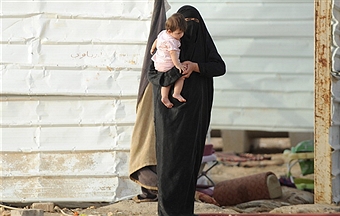On 9 March 2017, the UN Human Rights Council (HRC) held a panel discussion on preventable maternal mortality and morbidity as a human rights priority for all states. In the dialogue that ensued, speakers and organizations spoke of healthcare as a human right, and sharply criticized policies and practices around the world that contribute to hundreds of women and girls dying due to pregnancy and childbirth-related deaths every day. While their case was not explicitly raised during the panel discussion, stateless bidoon women in the Gulf region suffer greatly from such policies.
The bidoon are a particular community of stateless persons located in the Arab Gulf whose numbers are estimated at anywhere between 173,000 and more than 450,000 people. Kuwait and Saudi Arabia are home to the largest concentration of bidoon communities.
While they may find themselves stateless for a variety of reasons, most bidoon are the descendants of individuals who failed to register as citizens of whichever country they lived in during the official formation of the state. Laws in the region regulating naturalization and the passage of citizenship from parents to children have led to the effective entrenchment of this stateless condition ever since. As such, members of the bidoon community often have deep and multi-generational roots in their countries of origin but are treated by the state as outsiders and “illegal residents.” Across the Gulf Cooperation Council (GCC), the bidoon population’s lack of citizenship means that they are ineligible to receive the many benefits, including state-sponsored healthcare, that Gulf states provide to their citizens. However, while this has been criticized by governments and human rights organizations alike, the current conversation lacks a focus on the ways in which exclusion from the state-sponsored healthcare system contributes to maternal mortality and morbidity among the bidoon population.
The lack of access to state-sponsored healthcare creates specific challenges for bidoon women during pregnancy and the period of time immediately following birth. In particular, their inability to obtain state-sponsored care gives rise to significant hurdles in obtaining adequate antenatal care, labor and delivery care, and postnatal care. If a bidoon mother is not able to receive medical attention of this sort, both she and her baby are subjected to heightened risks of related health complications. In the event that such complications are experienced during or immediately after labor and the mother is unable to seek care from state-sponsored healthcare services because she is bidoon with no documentation, the very lives of the mother and baby may be placed at risk.
Bidoon women are sometimes placed in potentially life-threatening situations as a result of the kinds of national laws regulating citizenship and nationality referred to above. In Kuwait, for example, being bidoon can create significant challenges in obtaining state-issued forms of documentation, including birth and marriage certificates. Many bidoon women’s births go undocumented, and this lack of documentation in turn prevents them from accessing basic government services, including state-sponsored healthcare. As a result, when undocumented bidoon women in Kuwait give birth themselves, they may be often unable to do so in a public hospital. In this way, government-imposed restrictions on the bidoon population’s access to healthcare services can effectively force bidoon women into facing greater health risks during pregnancy than citizen women.
The lack of access to state-sponsored health facilities also seriously limits bidoon women’s ability to exercise family planning practices. Family planning allows a delay of pregnancy for young women at increased risk of health problems or death from early childbearing. Further, family planning can also prevent unintended pregnancies, including among women who face increased risks related to pregnancy.
The treatment of the bidoon community in the Gulf region stands in direct contravention of international human rights law. Article 15 of the Universal Declaration of Human Rights (UDHR) and Article 29 of the Arab Charter on Human Rights (ACHR), for example, state that everyone has the right to a nationality while the International Covenant on Civil and Political Rights (ICCPR) guarantees that every child has the right to acquire a nationality. Further, the UDHR states that everyone has the right to receive medical care and places a special emphasis on care during motherhood and childhood. The International Covenant on Economic, Social, and Cultural Rights (ICESCR) recognizes the right of everyone to the highest attainable standard of physical and mental health. Kuwait, which is home to between 93,000 and 106,000 bidoon, is a party to both the ICCPR and the ICESCR and is therefore in breach of its obligations under these treaties. The Convention on the Elimination of All Forms of Discrimination against Women (CEDAW), to which every country in the GCC has acceded, also recognizes the right to health.
Given these concerns, the international community must put added pressure on GCC states like Kuwait and Saudi Arabia to solve the problems created by their continued refusal to grant citizenship to a substantial number of bidoon. In the meantime, action must be taken to single out and understand the effects of statelessness on particular groups within bidoon communities, as advocacy efforts may well benefit from such specificity. In keeping with this, governments and human rights groups should pay immediate attention to the experience of pregnant and planning bidoon women in the GCC.





